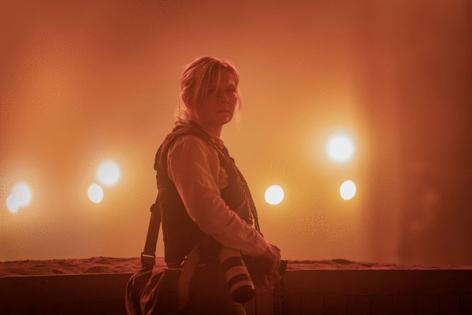Frank Barry: 'Civil War' is a gift to Trump's opponents
Published in Op Eds
Alex Garland’s box office hit, Civil War, which is set in a future America at war with itself, has drawn lots of criticism for not telling audiences what caused the conflict — and for its refusal to more realistically portray the battle lines that divide Red and Blue America. That critique not only gets the movie wrong, in my view, but it’s also blinding people to the film’s potential to positively influence the current political landscape, including the 2024 presidential election.
The power of Civil War lies in the question it forces viewers to ask: “How could this have happened here?” In a recent column calling Garland’s evasion of that question “a total cop-out,” New York Times columnist Ross Douthat offered up several possibilities: defeat in a war with China that causes an economic crisis, a pandemic that leads states to close their borders, new technology like AI that fuels desperation, or a climate catastrophe.
I was astonished that Douthat, who frequently writes about religion and sees Pope Francis’s modest attempts to create a more inclusive church as risking a schism in Catholicism, did not mention another dangerous force: Christian nationalism. But nor did he do so in a 2022 column throwing cold water on Barbara F. Walter’s outstanding book, How Civil Wars Start.
Douthat is hardly the only conservative who seems to be in denial about the threat that Christian nationalism poses to democracy. The danger of that denialism is powerfully brought home in Bad Faith, an excellent new documentary now streaming on Apple TV.
Like the Rob Reiner-produced film God and Country, which came out earlier this year, Bad Faith draws on Katherine Stewart’s 2019 book, The Power Worshippers, which pulls the curtain back on evangelical efforts to erase the line between church and state in legislative bodies, public schools and courtrooms — and to turn America into a theocracy, by any means necessary.
The films and book sound the alarm that some of Garland’s critics wish Civil War had incorporated, and understandably so. As Bad Faith makes clear, theocrats were in the vanguard of the January 6 attempted coup.
Today, as some evangelical pastors speak of a coming civil war, religiosity is increasingly at the center of Donald Trump’s campaign. Some of his rallies end with a prayer that mimics evangelical altar calls, when congregants approach the altar and commit themselves to Jesus. Trump-branded Bibles are an attempt to blur the line between Donald and deity — and to tie his political trials to the persecution of Jesus. Recently, Trump shared an article headlined, “The Crucifixion of Donald Trump.” And he has not ruled out more violence — potentially much worse violence — should he lose again.
In this sense, critics of Civil War have a valid point. It is almost impossible to talk about an American civil war without talking about Christian nationalism’s theocratic goals and violent tendencies.
Nevertheless, it’s also almost impossible for Democrats to engage conservatives on the topic of political violence by harping on Christian nationalism. Like Douthat, many conservatives just do not see — or do not want to believe — the connection. And that is precisely what makes the political neutrality of Civil War a virtue.
Had Garland’s plot mirrored current politics, conservatives would’ve shunned the movie as one more example of Hollywood’s liberal bias. Instead, he helped open a door for Trump’s opponents, giving them a chance to extend the discussion of political violence — and the ruinous, horrifying consequences it can bring — to the very people who will decide the November election.
Or in other words: he’s done what Democrats have spent more than three years trying to do with little success: inviting more Republicans and independents into the most important conversation in America.
The question is: What are Democrats doing to capitalize on it?
Liberal complaints about Civil War, like complaints about the bad faith of evangelicals, won’t move any votes. Encouraging Republicans to watch Bad Faith probably won’t be any more successful, unfortunately.
For Civil War to be a vehicle for bipartisan dialogue on political violence, Democratic leaders need to show themselves capable of engaging in some good faith reckoning of their own. This is also part of the film’s power: Garland wisely does not foreclose the idea that many of his liberal critics seem disinclined to entertain, that democracy can be threatened from the left, too.
What shape that threat could take, and what we can do about it, is a question I’ll explore in an upcoming column. But suffice it to say: in leaving these questions open to viewers, Garland got it right.
____
This column does not necessarily reflect the opinion of the editorial board or Bloomberg LP and its owners.
Frank Barry is a Bloomberg Opinion columnist and member of the editorial board covering national affairs. He is the author of the forthcoming book, "Back Roads and Better Angels: A Journey Into the Heart of American Democracy."
©2024 Bloomberg L.P. Visit bloomberg.com/opinion. Distributed by Tribune Content Agency, LLC.







Comments